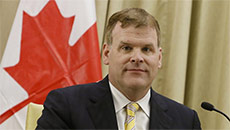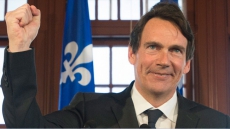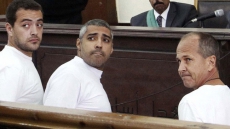VANCOUVER — British Columbia's mines minister is making plans to visit Alaska's indigenous fishing community after admitting his first trip to the state following the Mount Polley disaster addressed "probably the wrong audience."
Bill Bennett spoke at a major mining industry conference last fall, but met with none of the tribal groups in the southeast region presumed most threatened by upstream mining across the border in B.C.
In retrospect, Bennett said people living off the sea in the transboundary region have every right to be concerned about mines in his province, but that he wants to stem the rising anxiety by sharing more information.
"They do not have the kind of information and understanding of how we do things here in British Columbia that they need to have, and that's probably our fault," he told The Canadian Press. "I think that we can relieve some of these fears."
Bennett has asked a binational economic think-tank to consider organizing a symposium to bring both sides together in one of the southeastern Alaska towns at the heart of its multibillion-dollar fishing industry.
Bennett said he hopes the Pacific NorthWest Economic Region will convene a forum in a few months to share best practices and raise awareness about B.C.'s "rigorous" permitting process.
His idea comes after an independent report released in late January on the Mount Polley tailings dam spill that spewed 24 million cubic metres of silt and water into salmon-bearing rivers in the provincial Interior last August.
An engineering panel concluded a design flaw was to blame for the breach.
Bennett travelled to Anchorage last November on the invitation of the Alaska Miners Association. He said he incorrectly assumed that aboriginal groups would be there.
His "empathy" for the fishing community has prompted his pledge for a second trip, but the summit concept is already being panned.
"So they go there once a year and try to create a big meeting with a thousand people in the room? This is going to be a disaster," said Marcello Veiga, a University of British Columbia mining professor whose lectures focus on the industry's relationship with society and the environment.
He said Bennett's plan is exactly the opposite of what he teaches, warning that conflict is likely if various groups are brought together before they've established trust.
And while Veiga said there's a low risk of the Alaskan watershed being contaminated by B.C.'s mining industry, he added that having engineers simply inundate the public with data is not a solution.
"Facts will not change perceptions. What changes perceptions is trust."
Members of the fishing community in southeast Alaska were immediately wary.
"I trust the mining minister as far as I can throw a rock," said Rob Sanderson Jr., a vice-president of the Tlingit and Haida Indian Tribes of Alaska, based in Ketchikan.
While he welcomes Bennett's visit, he said what's required to get his 30,000 members onside would be more face-to-face meetings, meaningful consultation and the addition of a long-term mining liaison from B.C. in the region.
"Instead of shooting arrows at each other from across the border, you know?"
Chris Zimmer of Rivers Without Borders said from Juneau, Alaska, that action is needed instead of talk.
"If he wants to just come over here and do a PR campaign ... I don't think that's going to work."
Zimmer said people were insulted last fall by Bennett's message that southeast Alaskans would stop worrying if only they understood how B.C. mines are reviewed.
"It was patronizing, it was condescending," he said. "A lot of us have been watching the B.C. permitting process for 10 to 15 years and we have a lot of problems with what we've seen."
He cited examples including acid pollution from the long-abandoned Tulsequah Chief Mine in northwestern B.C., with an estimated 16 tons of waste water flowing into Alaska's salmon-bearing Taku River every year.
Zimmer also noted that the Red Chris copper and gold mine in B.C. was granted interim approval to open its tailings facility only days after the Mount Polley report specifically cautioned against a similar type of dam.
The permit runs through May, after which the company must seek further approval from the province's chief inspector of mines.
"We want to see actions and guarantees that B.C. isn't going to hurt our fish," Zimmer said.





